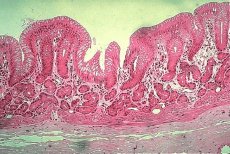Achlorhydria
Last reviewed: 23.04.2024

All iLive content is medically reviewed or fact checked to ensure as much factual accuracy as possible.
We have strict sourcing guidelines and only link to reputable media sites, academic research institutions and, whenever possible, medically peer reviewed studies. Note that the numbers in parentheses ([1], [2], etc.) are clickable links to these studies.
If you feel that any of our content is inaccurate, out-of-date, or otherwise questionable, please select it and press Ctrl + Enter.

Achlorhydria is a disorder in which gastric cells do not produce hydrochloric acid.
With this disease, there is a significant digestive disorder and a sharp deterioration in the state of health, but in some cases the disease occurs without any symptoms (a person may be burdened by eructations, heaviness after eating, and upset of the stool).
To date, there are no effective methods of treatment, mainly substitution therapy is prescribed.
With achlorhydria, many organs of the digestive system are disrupted.
Achlorhydria is functional and organic. Functional arises from the disruption of regulation of gastric secretion, organic achlorhydria develops with cancer tumors, gastritis, benign lesions in the stomach and other diseases in which the glandular apparatus changes.
Functional ahlogidry has a reversible character, whereas with organic there is an irreversible lesion of the cells of the stomach.
Acharyhydria of the stomach disrupts the natural process of digestion, but the lack of hydrochloric acid is compensated by the increased work of other digestive organs, so for a long time a person may not suspect a violation.
Causes
Achlorhydria develops as a result of a breakdown in the synthesis of hydrochloric acid, which can occur for a variety of reasons.
For example, if the immune system fails, the body may begin to attack its own stomach cells, which leads to the development of autoimmune gastritis.
Also the cause of achlorhydria can be microorganisms living in the stomach, age changes, persistent stresses, endocrine disorders, the last stage of kidney failure, malignant formations.
Symptoms
Achlorhydria does not manifest itself sharply, the symptoms of the disease manifest themselves as the disease progresses.
Symptomatology is associated with a violation of the digestion of proteins coming from food.
As a rule, patients with achlorhydria have pain in the epigastric region (weak, moderate or strong), belching, bloating, feeling full stomach, nausea.
Often, the disease is detected by accident (for example, during the diagnosis of the stomach before the operation, with liver diseases, etc.).
Diagnostics
Achlorhydria is diagnosed depending on individual clinical manifestations, without which it is impossible to determine the causes of the disease, to prescribe effective treatment, since the same symptoms may indicate several diseases in the digestive tract.
If suspected of achlorhydria is prescribed:
- a test for specific antibodies;
- a blood test for the level of pepsinogen and gastrin;
- Fibrogastroduodenoscopy (examination of the gastric mucosa with the help of an endoscope, which can show the disease - pallor, subtlety of the mucosa, and also it is possible to take a sample of the gastric tissue for further study);
- Chromostroskopia using dyes (introduction of dyes using an endoscope to assess the ability to produce hydrochloric acid by the lining cells);
- Fecal analysis for bacterial antigens;
What do need to examine?
What tests are needed?
Who to contact?
Treatment
Achlorhydria, unfortunately, does not have a specific treatment strategy. At the heart of the therapy is the replacement of the lack of hydrochloric acid and stimulation of the active covering cells. For treatment it is better to use an individual program developed by a specialist.
The therapeutic course may include a special diet, medications, physiotherapy drugs, alternative medicine.
Diet for achlorhydria should include foods that stimulate gastric secretion (cocoa, greens, cranberry juice, tomatoes, lemon, cabbage, rose hips, loose coffee).
It is also possible to add mineral waters to the diet (Essentuki No. 4 and 17, Narzan, Mirgorodskaya), which are better for consuming in a warm form.
Also, with Ahlogidrie, medications can be prescribed, which in each case are selected individually by a specialist.
Used substitution drugs (3% hydrochloric acid, Acidin-pepsin, Abomin, etc.), drugs that stimulate gastric secretion (Lipamid, Etymycil, calcium preparations, etc.), polyenzymes (Festal, Enistal, etc.) drugs that stimulate the recovery of the gastric mucosa (Beefungin, sea buckthorn oil, Etaden, vitamin complex), corticosteroid hormones (usually used in autoimmune gastritis).
Physiotherapeutic procedures are prescribed for moderate achlorhydria.
Increase the production of hydrochloric acid is well helped by electrophoresis with calcium chloride, peloidotherapy, hyperbaric oxygenation, etc.
Among the methods of alternative medicine with reduced production of hydrochloric acid in the stomach used medicinal herbs in the form of broths, tinctures, phytoapplications.
With achlorhydria, fennel, horseradish root, centipedes, thyme, caraway, calendula, plantain, hops, which stimulate the secretion of the stomach, are good. Alternative methods show good efficacy in combination with other therapies and are not suitable as an independent treatment.
More information of the treatment
Prevention
Achlorhydria is a consequence of a disease, therefore, as a preventive measure, it is recommended to follow a diet, alternate work and rest, and to treat existing diseases in a timely manner.
Forecast
Since, achlorhydria is not a major disease, the prognosis of treatment depends on the cause that caused the disorder.
Achlorhydria leads to a decreased acidity of the gastric juice, which is why the digestive process is disrupted. Violation of the secretory function of the covering cells occurs for various reasons, which can have both reversible and non-reversible character.
With this violation, it is important to determine the cause that triggered a decrease in the secretory function of the stomach, and eliminate it, otherwise there can be serious consequences.


 [
[